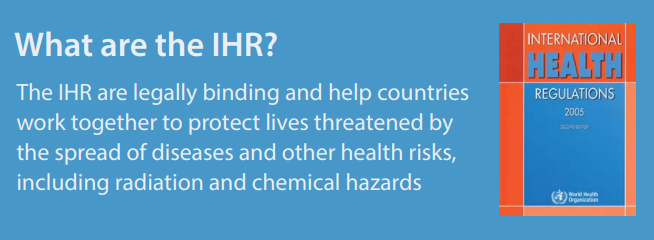
#17,204
The lack of openness on the part of China regarding their current COVID epidemic has led numerous countries to reinstate testing requirements - either before departure or upon arrival - for travelers coming from China (see Spain, Italy, Japan & India Reinstate Testing For Travelers From China).
While the IHR 2005 rules and regulations require all countries to report novel disease outbreaks, and to provide sequences of novel viruses to the WHO, China - along with a number of other countries - often only comply with this international agreement when it suits them.
Frustratingly, from Indonesia’s refusal to share H5N1 virus samples to the Saudi’s chronic foot dragging on MERS, to China's chronic belated reporting on avian flu, we’ve seen many examples where the spirit – and often the actual letter – of the 2005 IHR has been ignored by member nations.
As a result, we often only belatedly learn about spillovers of avian flu, coronaviruses, and other public health threats . . . assuming we hear about them at all.
Although China's daily reporting of COVID cases and deaths for the past 3 years has been highly suspect at best, over the past couple of weeks it has been completely dismantled as their COVID pandemic has abruptly worsened.
On Christmas day - as anecdotal reports of swamped hospitals, and crematoriums operating 24/7, filtered out of the country - China's NHC announced they would no longer be reporting any data at all.
While the WHO rarely publicly calls out member nations for not abiding by the IHR 2005 regulations (see here and here for two examples), late yesterday they published the following statement regarding a meeting with Chinese officials over their lack of disclosure.
WHO meets with Chinese officials on current COVID-19 situation
30 December 2022
Statement
A high-level meeting took place on 30 December between WHO and China about the current surge in COVID-19 cases, to seek further information on the situation, and to offer WHO's expertise and further support.
High-level officials from China's National Health Commission and the National Disease Control and Prevention Administration briefed WHO on China's evolving strategy and actions in the areas of epidemiology, monitoring of variants, vaccination, clinical care, communication and R&D.
WHO again asked for regular sharing of specific and real-time data on the epidemiological situation — including more genetic sequencing data, data on disease impact including hospitalisations, intensive care unit (ICU) admissions and deaths — and data on vaccinations delivered and vaccination status, especially in vulnerable people and those over 60 years old. WHO reiterated the importance of vaccination and boosters to protect against severe disease and death for people at higher risk.
WHO called on China to strengthen viral sequencing, clinical management and impact assessment, and expressed willingness to provide support on these areas, as well as on risk communications on vaccination to counter hesitancy. Chinese scientists are invited to engage more closely in WHO-led COVID-19 expert networks including the COVID-19 clinical management network. WHO has invited Chinese scientists to present detailed data on viral sequencing at a meeting of the Technical Advisory Group on SARS-CoV-2 Virus Evolution on 3 January.
WHO stressed the importance of monitoring and the timely publication of data to help China and the global community to formulate accurate risk assessments and to inform effective responses.
While the IHR 2005 is described as a `legally binding' agreement, there is little recourse for the WHO and the international community when a nation decides - for political, economic, or prestige reasons - to withhold crucial information.
Seven years ago, in Adding Accountability To The IHR, we looked at the Ebola Interim Assessment Panel's recommendations for strengthening the IHR. It is fair to say that whatever changes have been made, have not been sufficient.
Hopefully, whatever COVID is brewing behind closed doors in China won't blow up in our faces. But the problem doesn't end there. All around the world there are ample opportunities for novel viruses to spillover into humans; avian flu, swine flu, bat coronaviruses, and more.
Unless, and until, all nations take the reporting of these types of events seriously - and share them as required by the IHR 2005 agreement - the world remains at significant risk of being blindsided by another emerging pandemic threat.
And as bad as COVID has been, the next one could be worse.
